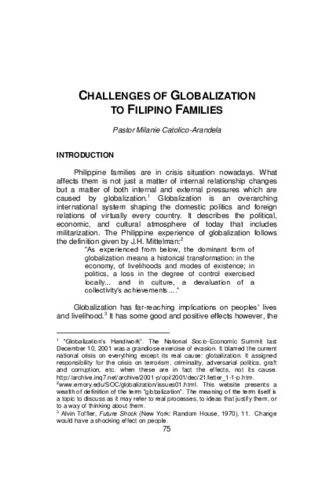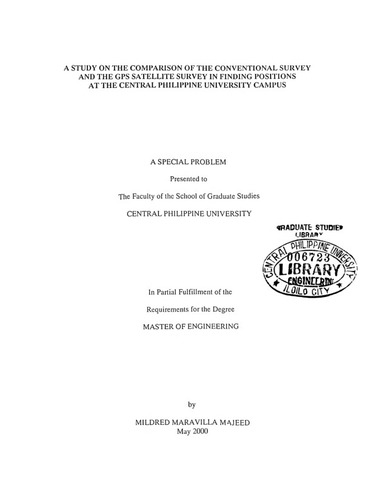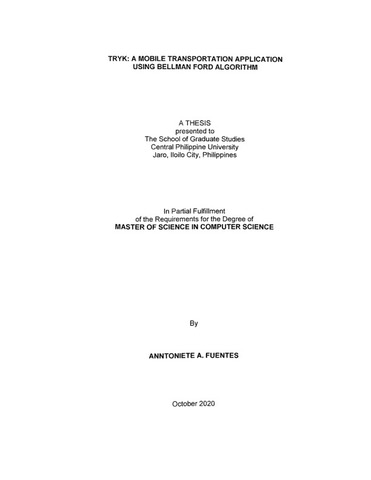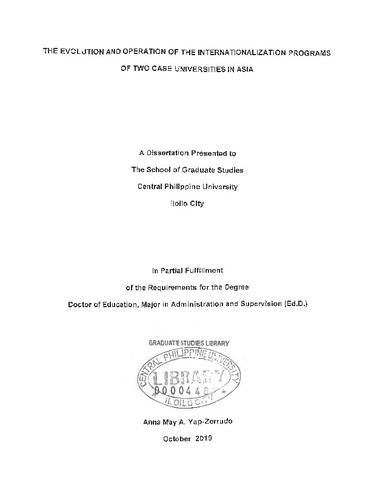Challenges of globalization to Filipino families
| dc.contributor.author | Arandela, Milanie C. | |
| dc.date.accessioned | 2022-01-21T04:05:25Z | |
| dc.date.available | 2022-01-21T04:05:25Z | |
| dc.date.issued | 2007 | |
| dc.identifier.citation | Arandela, M. C. (2007). Challenges of globalization to Filipino families. Journal of Theology, 3, 75-143. | en_US |
| dc.identifier.uri | https://hdl.handle.net/20.500.12852/1884 | |
| dc.description | Journal article | en_US |
| dc.description.abstract | Philippine families are in crisis situation nowadays. What affects them is not just a matter of internal relationship changes but a matter of both internal and external pressures which are caused by globalization. Globalization is an overarching international system shaping the domestic politics and foreign relations of virtually every country. It describes the political, economic, and cultural atmosphere of today that includes militarization. The Philippine experience of globalization follows the definition given by J.H. Mittelman: “As experienced from below, the dominant form of globalization means a historical transformation: in the economy, of livelihoods and modes of existence; in politics, a loss in the degree of control exercised locally… and in culture, a devaluation of a collectivity’s achievements….” Globalization has far-reaching implications on peoples’ lives and livelihood. It has some good and positive effects, however, the negative outweighs them. In the Philippines, globalization worsens the already poor situation of the masses. It sends millions of Filipinos to work on a global stage where there is shortage of laborers, skilled, domestic and professional workers. This is because of unemployment and underemployment brought about by structural adjustments in the country. Globalization has converted rice lands, water and ancestral domain of indigenous peoples to multi-national companies for export products, high-tech fishing and mining operations, respectively. Farmers and fisher folks go empty-handed, hungry and mostly indebted while indigenous peoples wander to exist. The import liberalization policy has destroyed the domestic economy as it continues the closure of small and medium enterprises. It causes Filipinos to consume cheaper import products and their own products left unsold or sold at a much cheaper price. Globalization allows privatization of social institutions (e.g. schools, hospitals and other social centers) and services (e. g. water and light), that are much needed by the poor majority. Globalization allows foreign militarization into the country to fight the so-called global terrorism. This threatens people, destroys nature and life rather than build peace and justice. The effects of globalization are felt worldwide and, sad to say, the Philippines is on the losing side. | en_US |
| dc.language.iso | en | en_US |
| dc.publisher | Institute of Advanced Theological Studies (IATS) and College of Theology | en_US |
| dc.subject.lcsh | Globalization | en_US |
| dc.subject.lcsh | Globalization--Social aspects | en_US |
| dc.subject.lcsh | Globalization--Economic aspects | en_US |
| dc.subject.lcsh | Foreign workers | en_US |
| dc.subject.lcsh | Filipinos | en_US |
| dc.subject.lcsh | Families | en_US |
| dc.subject.lcsh | Globalization--Religious aspects | en_US |
| dc.subject.lcsh | Globalization--Religious aspects--Christianity | en_US |
| dc.title | Challenges of globalization to Filipino families | en_US |
| dc.type | Article | en_US |
| dc.citation.firstpage | 75 | en_US |
| dc.citation.lastpage | 143 | en_US |
| dc.citation.journaltitle | Journal of Theology | en_US |
| dc.citation.volume | 3 | en_US |
| dc.citation.issue | 1 | en_US |
| local.subject | Overseas Filipino Workers (OFWs) | en_US |
Files in this item
This item appears in the following Collection(s)
-
Journal articles [28]
-
Journal of Theology [24]
A joint publication of the Institute for Advanced Theological Studies (IATS) and College of Theology, Central Philippine University





